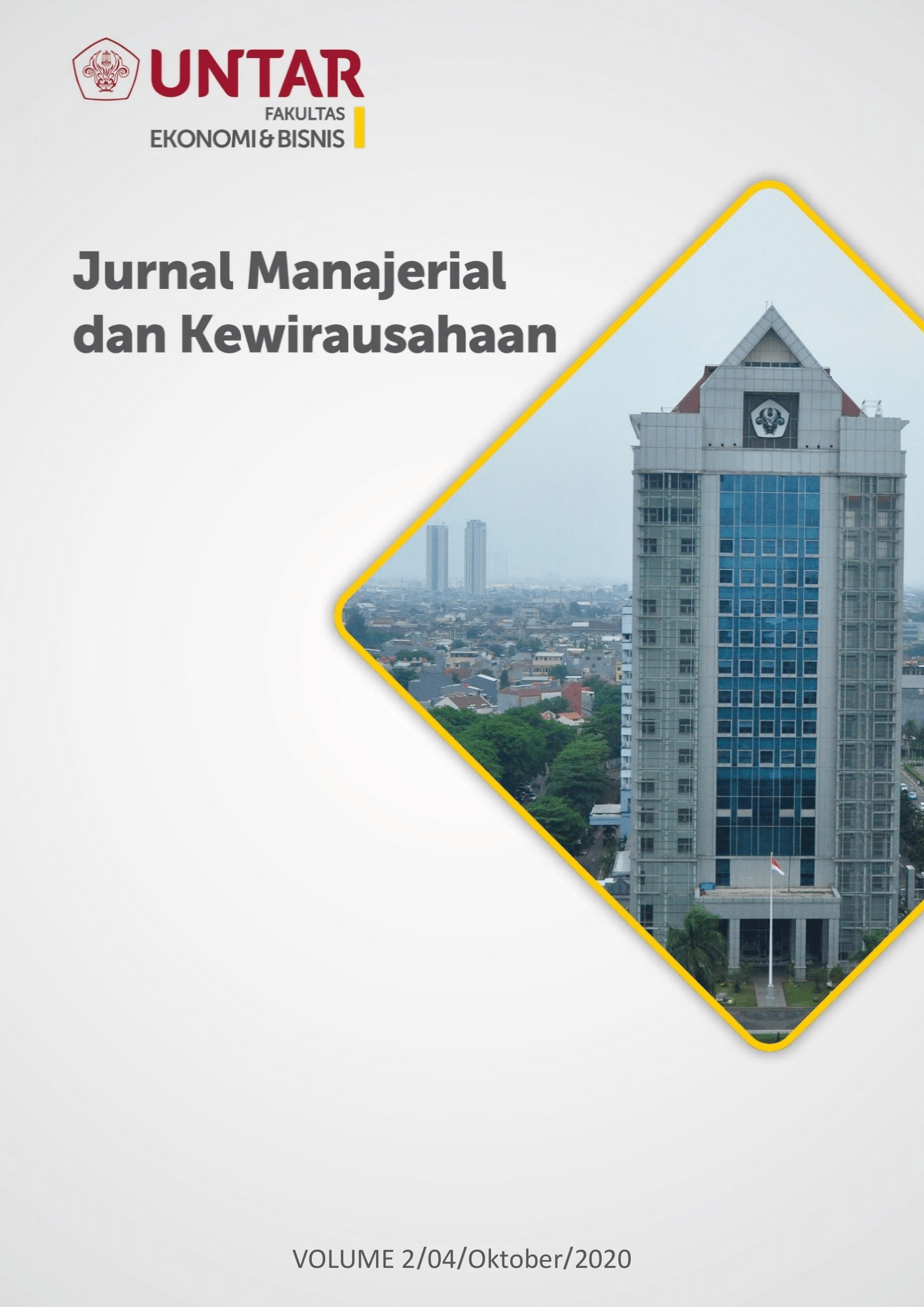Pengaruh Orientasi Kewirausahaan, Lingkungan dan Media Sosial terhadap Kinerja Usaha UMKM di Jakarta
Main Article Content
Abstract
The purpose of this study was to determine the effect of entrepreneurial orientation on business performance, to determine the effect of the environment on business performance, and to determine the effect of social media on business performance. The population in this study are all SMEs owners in Jakarta. Non-probability sampling method will be used in this study with the sampling technique used is purposive sampling. The determined sample is 50 entrepreneurs who are business owners in the culinary field in the Kelapa Gading area who have been in business for more than one year. Data processing uses Structural Equation Modeling (SEM) analysis with the help of the SmartPLS application. Overall results of this study are, entrepreneurial orientation affects business performance, the environment does not affect business performance, and social media influences business performance.
Tujuan penelitian ini adalah untuk mengetahui, pengaruh orientasi kewirausahaan terhadap kinerja usaha, untuk mengetahui pengaruh lingkungan terhadap kinerja usaha, dan untuk mengetahui pengaruh media sosial terhadap kinerja usaha. Populasi dalam penelitian ini adalah seluruh pemilik UMKM di Jakarta. Metode pengambilan sampel dalam penelitian ini adalah non-probability sampling dengan teknik pengambilan sampel, yaitu purposive sampling. Sampel yang diambil sebanyak 50 wirausaha yang menjadi pemilik usaha dibidang kuliner di daerah Kelapa Gading yang menjalankan bisnisnya lebih dari satu tahun. Pengolahan data meenggunakan analisis Structural Equation Modeling (SEM) dengan bantuan aplikasi SmartPLS. Secara keseluruhan hasil dari penelitian ini adalah orientasi kewirausahaan berpengaruh terhadap kinerja usaha, lingkungan tidak berpengaruh terhadap kinerja usaha, dan media sosial berpengaruh terhadap kinerja usaha.
Article Details
This work is licensed under a Jurnal Muara Ilmu Ekonomi dan Bisnis Creative Commons Attribution-ShareAlike 4.0 International License.,/p>
References
Adebayo, P. (2015). Impact of social media on students' entrepreneurial orientation: a study of selected institutions in Nigeria. Journal of the International Association of Advanced Technology and Science, 1(12), 1-13.
Bastian, I. (2001). Akuntansi Sektor Publik di Indonesia. Yogyakarta: BPFE.
Batjargal, B., Hitt, M., & Tsui, A. (2013). Institutional polycentrism, entrepreneurs' social networks, and new venture growth. Academy of Management Journal, 56(4), 1024-49.
Colton, D., Roth, M., & Bearden, W. (2010). Drivers of international e-tail performance: the complexities of orientations and resources. Journal of International Marketing, 18(1), 1-22.
Farzana, P., Noor Ismawati, J., & Sulaiman, A. (2016). Social media's impact on organizational performance and entrepreneurial orientation in organizations. Management Decision, 2198-2211.
Frishammar, J., & Horte, S. (2007). The role of market orientation and entrepreneurial orientation for new product development performance in manufacturing firms. Technology Analysis & Strategic Management, 19(6), 765-88.
Ghozali, I. (2014). Aplikasi Analisis Multivariate Dengan Program IBM SPSS 23 (Edisi 8) Cetakan ke VIII. Semarang: Badan Penerbit Universitas Diponegoro.
Griffin, W. (2004). Manajemen. Edisi 10. Jakarta: Erlangga.
Hasibuan, M. (2001). Manajemen Sumber Daya Manusia Edisi Revisi. Bandung: PT. Bumi Aksara.
Hult, G., Hurley, R., & Knight, G. (2004). Innovativeness: its antecedents and impact on business performance. Industrial Marketing Management, 33(5),429-438.
Kent, M. (2013). a delphi study of the future of new technology research in public relations. Public Relation Review, 40(3), 31-65.
Korsten, P., Lesser, E., & Cortada, J. (2013). Social business: An opportunity to transform. Strategy & Leadership, 41(3), 20–28.
Lumpkin, G., & Dess, G. (2001). Clarifying the entrepreneurial orientation construct and linking it to performance. Academy of Management Review, 21(1), 135-172.
Mai, Y., & Gan, Z. (2007). Entrepreneurial opportunities, capacities and entrepreneurial environments: Evidence from Chinese GEM data. Chinese Management Studies, 1(4), 200-220.
Miller, L., & Dess, L. (2006). Handling nonresponse issues. Journal of Extension, 21(5), 10-50.
Moerdiyanto, M. (2010). Pengaruh tingkat pendidikan manajer terhadap kinerja. Cakrawala Pendidikan, 1, 116-29.
Philip, L. (2017). International Financial Integration in the Aftermath of the Global Financial Crisis. International Monetary Fund, 10-115.
Primbada, S. (2015). Manfaat penggunaan media sosial pada usaha kecil menengah. Seminar Nasional Sistem Informasi Indonesia, 41-6.
Qian, Z. (2004). Chinese Auto Industry in 21 Century. Beijing: Beijing Institute of Technology Press.
Rudjito, A. (2003). Peran Lembaga Keuangan Mikro dalam Otonomi Daerah Guna Menggerakkan Ekonomi Rakyat dan Menanggulangi Kemiskinan. Jurnal Ekonomi Rakyat.
Sekaran, U., & Bougie, R. (2013). Research methods for business: A skill- building approach. United Kingdom: John Wiley & Sons.
Wales, W. J., Gupta, V. K., & Mousa F. (2013). Empirical research on entrepreneurial orientation: An assessment and suggestions for future research. International Small Business Journal, 31(4), 357-83.
Wiklund, J., & Shepherd, D. (2005). Entrepreneurial orientation and small business performance a configurational approach. Journal of Business Venturing, 20(1), 71-91.
Zhang, Y. (2002). The effect of entrepreneurial orientation on business performance: A role of network capabilities in China. Journal of Chinese Entrepreneurship, 4(2), 15-60.



